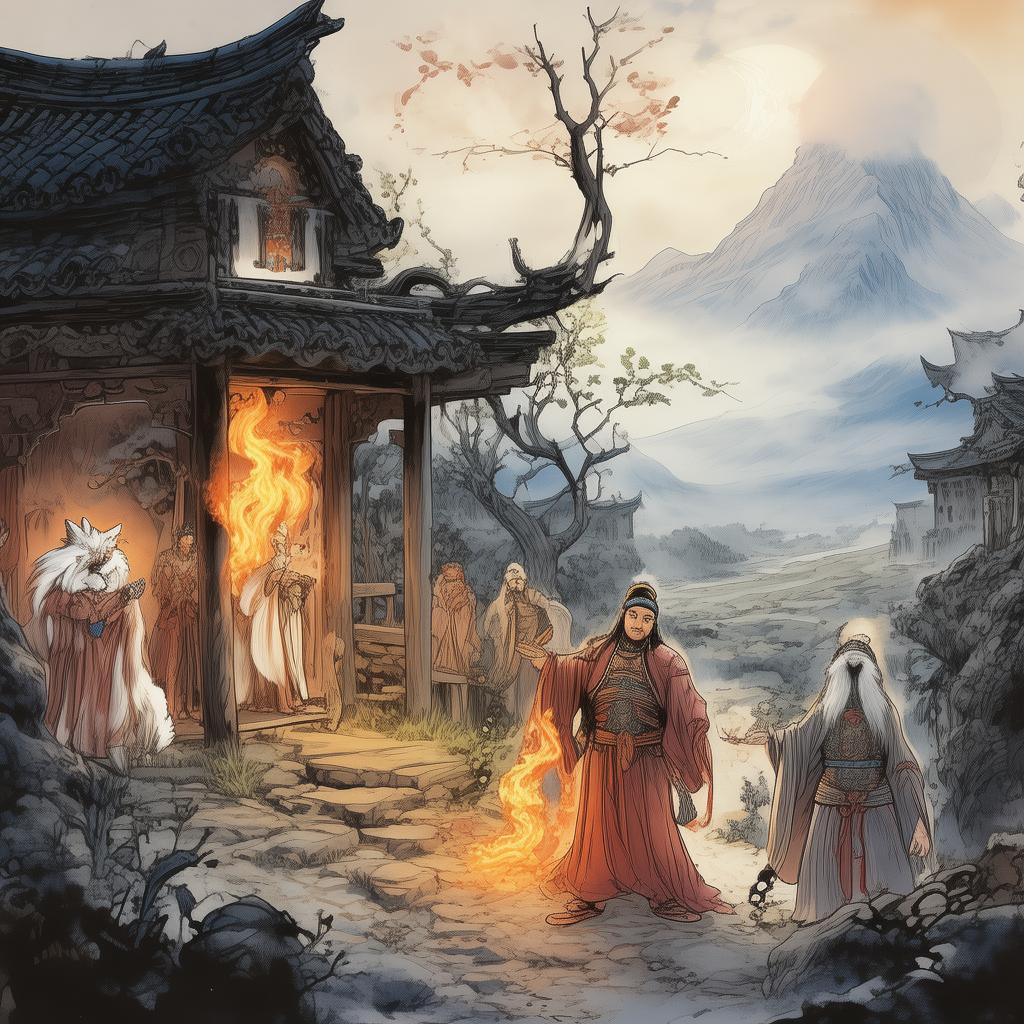The Forbidden Tomb: The Widow's Sinful Love Unveiled
In the heart of the ancient village of Liangshan, nestled between towering mountains and the whispering river, there stood an ancient tomb, hidden from the eyes of the living. It was said to be the resting place of a great warrior, whose heart was as fierce as his sword. The tomb was forbidden, its entrance sealed with a riddle that none had solved for centuries.
Among the villagers was a young widow named Hua Mei, whose beauty was as captivating as her sorrow. Her husband had died mysteriously, leaving her a young daughter and a village that whispered of her husband's last words: "Find the forbidden tomb, and you will find me."

Hua Mei, driven by love and a mother's instinct, set out to uncover the truth. She was a woman of strength and resilience, but also of tender heart. She sought the wisdom of the village elder, Master Li, a man whose eyes held the secrets of the ages.
"Master Li," Hua Mei implored, "the tomb is said to be filled with sin and sorrow. Will you guide me?"
Master Li's eyes twinkled with a knowing smile. "Hua Mei, the tomb is not just a place of rest. It is a testament to love and betrayal, to the sin of forbidden love. Only those who have the courage to face their own hearts can unlock its secrets."
Determined, Hua Mei began her journey. She traveled through the dense forest, crossed the treacherous river, and climbed the steep mountains. Along the way, she encountered whispers of the past, tales of love and loss that echoed through the ages.
As she neared the tomb, she felt a strange pull, as if the earth itself was beckoning her. The tomb was a massive stone structure, its entrance covered in intricate carvings that told the story of a forbidden love.
Hua Mei's heart raced as she reached the entrance. She read the riddle etched into the stone:
"Who seeks the tomb's embrace,
Must first face the heart's embrace.
Only the pure of heart may pass,
Through the gates of sin and pass."
Understanding the riddle, Hua Mei knew she must confront her own heart. She had loved her husband deeply, but their love had been forbidden by the village elders. It was a love that had caused her husband's death, and now it threatened to consume her.
With a deep breath, Hua Mei stepped through the entrance, her heart pounding with fear and hope. The tomb was vast, its walls lined with the bones of the past. She followed a narrow path, her torch casting flickering shadows on the walls.
Finally, she reached a chamber, the air thick with the scent of decay. In the center of the chamber stood a pedestal, upon which lay a mirror. Hua Mei approached the mirror, her reflection staring back at her with eyes full of sorrow and love.
She reached out and touched the mirror, feeling a surge of emotions. She saw her husband's face, smiling and loving, and then she saw the pain and betrayal in his eyes. She realized that her love had been a sin, and that she had been the instrument of her own sorrow.
Suddenly, the ground beneath her feet trembled, and the walls of the tomb began to close in. Hua Mei knew that she had to make a choice. She could run, but she knew that the tomb would not let her go. She could hide, but she knew that the truth would find her.
With a heavy heart, Hua Mei stepped back from the mirror, her hands trembling. She turned to face the closing walls, her eyes filled with tears. "I love you," she whispered, "but I must let you go."
As the walls closed, Hua Mei felt a surge of peace. She had faced her sin, and she had chosen to let go. The tomb, with its secrets and sorrows, had taught her the true meaning of love and forgiveness.
The village of Liangshan whispered of the widow's journey, and of the forbidden tomb. They spoke of Hua Mei's courage and her love, and of the lesson she had learned. They said that the tomb was no longer forbidden, but a place of peace, where the soul of a woman had found her freedom.
And so, the story of Hua Mei and the forbidden tomb became a legend, a tale of love, sin, and redemption that would be told for generations to come.
✨ Original Statement ✨
All articles published on this website (including but not limited to text, images, videos, and other content) are original or authorized for reposting and are protected by relevant laws. Without the explicit written permission of this website, no individual or organization may copy, modify, repost, or use the content for commercial purposes.
If you need to quote or cooperate, please contact this site for authorization. We reserve the right to pursue legal responsibility for any unauthorized use.
Hereby declared.









